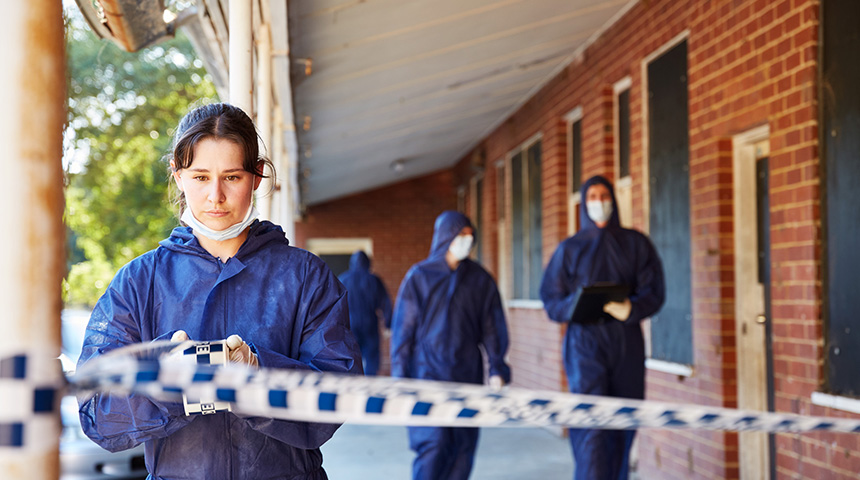
Make a difference to the lives of individuals and communities through scientific breakthroughs, disease detection, crime solving or creating better foods. Learn more about career options in these exciting and growing scientific fields.
Where do you see your future in science?
Will you be a quiet hero, part of the next generation of scientists solving the planet’s biggest food challenges? Or will you be investigating a forensic cold case, or perhaps exploring disease and how we can control or even eradicate some of humanity’s most deadly biological foes?
You can change the world in so many ways, starting with a course at our School of Medical, Molecular and Forensic Sciences.
Would a career in medical science suit you?
Think you have the qualities that make a scientist? See if you identify with any of the below.
Do you:
- Have an inquisitive nature?
- Wonder about the limitless possibilities of science?
- Approach problems logically and methodically?
- Have excellent attention to detail?
- Enjoy exploring biology and human biology?
- Think about how we can modify genes?
- Want to help improve human health?
- Believe you can make a positive impact?
If you feel like the above describes you, science could be a great career option. It’s a hands-on career with new technologies and techniques advancing the field all the time. Learn about studying with Murdoch’s School of Medical, Molecular and Forensic Sciences.
What kind of career can you have in Medical, Molecular and Forensic Science (MMFS)?
Let’s take a look at some popular career paths.
Medical Researcher
Your theoretical knowledge and practical experience will prepare you to tackle the most pressing challenges in biomedicine. You could be part of the next big breakthrough in understanding, diagnosing, treating and preventing human disease.
Clinical Laboratory Scientist
Become a crucial member of the healthcare system, ensuring accurate disease diagnosis and contributing to the management of patient care. You’ll perform clinical testing and analyse and report results in a clinical laboratory discipline including microbiology, immunology, biochemistry, haematology, diagnostic genomics or histopathology.
Molecular Biologist
With your in-depth knowledge of the building blocks essential for life, you can help solve urgent real-world problems in diverse areas. You might work in genetic engineering and gene editing, improving human and animal health, revolutionising crops to cope with climate change, or helping produce biodegradable materials from renewable resources.
Food Scientist/Nutritionist
Will you get career fulfilment from delving into the fascinating complexities of food composition, sensory effects, and dietary analysis, gaining insights into how food impacts health and well-being? You could uncover secrets behind food development, preservation, and innovation and make a difference to the lives of individuals and communities through informed nutrition.,
If you want to work … as a forensic expert
From CSI to Bones, there’s nothing like a twisty mystery solved by forensics. The opportunities are endless, with this field underpinned by traditional sciences like biology, chemistry and physics, and crossing paths with criminology. Possible careers include crime scene officer, forensic biologist, forensic investigator, toxicologist and forensic research scientist. Depending on your role, you might comb through a crime scene, investigate possible weapons, analyse DNA data, collect samples, and more. Our major in Forensic Biology and Toxicology is an ideal starting point to get you there.
You could also be a double threat in the world with a Bachelor of Criminology / Bachelor of Science (a sought-after course that is a WA-first) studying Forensic Biology and Toxicology, alongside a Criminology major.
Picture where a degree from Murdoch could take you
You might imagine a career in this arm of science automatically means wearing a big white coat in a lab. Whilst this is absolutely an option, there are plenty of other pathways open to you.
Your ‘office’ could be, yes, a laboratory, but you may also find yourself in/at:
- Biotechnology
- Pharmaceutical industry
- Biomedical or health administration
- Computer-based data analysis
- Scientific communication
- A crime scene alongside detectives and other scientists
- Secondary or university education
- Medical scientific marketing and supply
- Hospital role
- Board member as an executive
- Advising officials in the halls of government, or
- Agriculture
A career in this field has the potential to change lives. Are you ready for the challenge?
Can I get a job? Future-proof your career
Yes! As a Murdoch graduate, you’ll have an edge over the competition.
For example, we have one of the best Laboratory Medicine courses in Australia with nation-leading rates of employment upon graduation. We offer small class sizes, experienced lecturers, outstanding student support systems, and practical learning. Our team has strong connections with diagnostic pathology providers, offering high employability and research opportunities in diagnostic pathology, biomedicine, and public health.
We’ve been a pioneering university in so many ways, and we’re not slowing down. Join us on this shared journey in scientific discovery. Ngala Kwop Biddi.